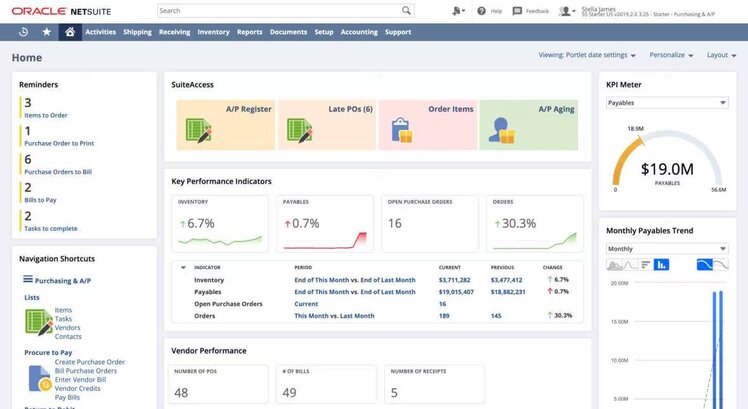
Comprehensive Guide: Switching from Epicor to NetSuite for Manufacturing
Considering an ERP move from Epicor to NetSuite? This in-depth ERP comparison for manufacturers covers cloud ERP deployment, functionality, customization with SuiteScript, cost/TCO, and reliability—giving operations and IT leaders the insights they need to plan a confident Epicor to NetSuite migration and long-term ERP roadmap.
Executive Summary
Switching from Epicor to NetSuite gives manufacturers a unified, cloud-native, scalable ERP platform that is easier to use, customize, and maintain. NetSuite offers native, out-of-the-box functionality across finance, CRM, supply chain, eCommerce, and PSA, while Epicor often relies on add-ons and complex customizations. NetSuite’s global capabilities, high reliability, and rapid SuiteSuccess implementation make it a “future‑proof” choice for manufacturing organizations seeking operational agility, real-time analytics, and lower total cost of ownership [1][5][6][7].
Side-by-Side Comparison Table
| Feature | NetSuite | Epicor |
|---|---|---|
| Deployment Model | 100% cloud-native SaaS, automatic upgrades | Hybrid/on‑prem roots, cloud add‑on, complex upgrades [5][7] |
| Core Modules (Native) | Finance, SCM, Inventory, CRM, HR, eCommerce, PSA | Manufacturing core; many modules require integrations |
| Industry Specialization | Manufacturing, distribution, plus retail, software, CPG | Deep manufacturing focus; strong for regulated sectors |
| Customers/Countries | 37,000+ / 219+ | 21,000+ / 150+ |
| Customization | SuiteScript, intuitive workflows, custom records (no downtime) [3][7] | .NET/Angular, BPMs; downtime common; field adds complex [3][7] |
| Reporting & Analytics | Hundreds of real-time reports; dashboards modifiable with clicks | SSRS/Crystal; prone to breaking; specialists required [5][3] |
| Implementation Speed | SuiteSuccess fixed-bid, fast & predictable [1] | Heavier lift, longer timelines, higher cost [1] |
| Support & Ecosystem | Global support; 600+ SuiteApps; large community | Smaller ISV network; niche user base |
| TCO/Price Model | Simple subscription; modern modular scale | Add-ons increase cost; complex pricing [1] |
| UI & Usability | Modern, intuitive, minimal training | Complex menus; steeper learning curve; buggier [3] |

Detailed Point-by-Point Comparison
1. Deployment, Architecture, and Upgrades
- NetSuite was built for the cloud from day one—everyone operates on the same, always‑up‑to‑date SaaS version, reducing IT overhead, cybersecurity risk, and upgrade pain. Enhancements carry forward through upgrades, so your investment is protected [1][5][6].
- Epicor has legacy on‑premise roots retrofitted for cloud. Upgrades can break customizations and core processes, causing version‑lock and higher support costs. Multi‑platform legacy can lead to messy integrations [5][1].
2. Functionality & Native Features
NetSuite delivers end‑to‑end business management—financials, supply chain, manufacturing scheduling, order management, CRM, HR, payroll, eCommerce, and PSA—all in one system with real‑time data flow and analytics [6][7][1]. Epicor is strong in discrete/process manufacturing and shop‑floor controls, but often requires added integrations for CRM, eCommerce, or BI/reporting stacks [5][6].
| Core Features | NetSuite | Epicor |
|---|---|---|
| Full native CRM | ✓ | ✗ |
| Omnichannel commerce | ✓ | ✗ |
| Payroll/HR native | ✓ | ✗ |
| Financials/SCM | ✓ | ✓ |
| Manufacturing Suite | ✓ | ✓ |
| eCommerce native | ✓ | ✗ |
3. Customization, Usability, and Reliability
- NetSuite enables intuitive customization via SuiteScript and workflows. Adding fields or automations is quick, typically requires no downtime, and uses upgrade‑safe custom records supported by a large developer community [3][5].
- Epicor customization is powerful but less accessible for business users. Minor changes (e.g., adding fields) often require planned downtime and expertise in .NET/BPMs. Reports and forms may break with updates; Angular UI transitions add complexity [7][3].
- The NetSuite ecosystem accelerates best practices and innovation; Epicor’s community is tighter, which can slow peer troubleshooting [3][7][5].
4. Scalability and Global Operations
- NetSuite supports multi‑subsidiary organizations natively—multi‑language, multi‑currency, and real‑time consolidation—making global growth smoother [1][7].
- Epicor generally supports fewer countries out of the box and may require extra modules for global rollouts, increasing complexity and cost [1].
5. Cost, Pricing and Total Cost of Ownership
- NetSuite uses a transparent subscription model based on modules and users—no hardware, patching, or upgrade costs. Adding capabilities is predictable and scalable [1].
- Epicor can present attractive upfront licensing, but add‑ons, integrations, and maintenance often raise long‑term TCO—especially when upgrades impact customizations [7][1].
Real‑World User Perspective
Ease of Use: “NetSuite is much easier to use; Epicor/Kinetic can feel messy with its menu and transaction structure.”
Customization: “NetSuite makes it trivial to add fields and workflows. In Epicor, even minor changes require scheduled downtime and .NET know‑how.”
Community: “NetSuite’s developer ecosystem is broad and active. Epicor’s is tighter, so troubleshooting can be slower.”
Upgrades: “Epicor upgrades often break reports and customizations; NetSuite upgrades preserve enhancements.” [3]

